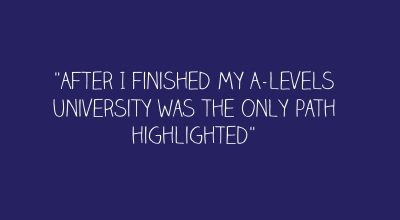Have you recently graduated and looking for employment? Youth Employment UK spoke to Becki Raper who told us that she:-
“Never thought it would be so hard to start my career and I continuously felt lost in what I wanted to do. I kept questioning what I should be doing and felt like I was a disappointment to my parents for not doing them ‘proud’.”
She did however find her dream job through volunteering, networking and getting herself out there! Here’s Becki’s story and how she found employment after university!
Name: Becki Raper
Age: 24
Degree studied at university: Geography (BA Hons)
“What was your experience like searching for employment post university?”
Post university, I went back to live with my parents in York and got part time work whilst looking for my ‘dream job’.
I narrowed my search to jobs that requested graduates, I didn’t want my time at university and debt I was in to be all for nothing.
Applying for jobs, only having family in York meant that I wasn’t in the best place for job opportunities. I sent off applications for quite a few . Some I would hear back from, others were completely silent. I quickly learned that sometimes the roles just weren’t suitable, either too short a contract or not paying enough for me to be able to move to.
Everything also always seemed to be about experience, which having been in education, I didn’t have. I ended up taking a very short 3- week volunteering role for an environmental type charity in London. I would not have been able to afford to stay longer with the money loss I was facing.
However, through making contacts with other people with environmental degrees I then, 6 months later, got work through hearing about a role for a sustainability assistant with a construction contractor working on the Olympics project. It was a 2-month contract, which was extended to 4 and then I was recommended for a position so I am here permanently!
“Did you apply for any graduate schemes?”
I maybe took a few online tests (numerical, verbal reasoning), but the whole process of spending days filling in application forms and then failing a 10 minute test, I thought, was just not worth it. I didn’t want to be considered a number that is only judged by a timed assessment. I don’t think I would be able to cope with rejection after having attended several centres and fail at the last hurdle. Hats off to those that apply to these scary graduate schemes!
“How many schemes did you apply to?”
About 5 maybe, but that is because I lost the will after the traumas faced when trying to apply for them. I had friends who applied to 100s.
“Of those you applied to, how many did you a) hear back from b) were successful at applying to?”
I would say I applied to over 50 jobs and roughly, heard back from about 50%, it was a generic email sent to all those unsuccessful.
“How ‘youth friendly’ was your experience when searching/applying for employment post university?”
There was basically too many people applying for the same job, and there was nothing you could really do without experience to set yourself apart from all the rest. By not even making interviews, it doesn’t give you chance to shine in person to the employer.
“How long were you out of employment for before securing long term employment?”
Between university and my current job, I was at home with my parents for a total of 10 months, continuously getting bogged down in job applications. I never thought it would be so hard to start my career and I continuously felt lost in what I wanted to do. I kept questioning what I should be doing and felt like I was a disappointment to my parents for not doing them ‘proud’. It was hard work, but it definitely pays to put yourself out there and meet as many people as possible.
“What advice would you give to graduates/ young people as they seek employment and struggle to hear back from applications?”
I would advise them to keep trying. It will all be worthwhile when you get that break. I definitely think networking is good, so if you can find events where people in the field you want to work in are, that is a good start. The most important thing is not to be too selective. You never know without doing a job if it is for you, so don’t be afraid to give other types of work/experiences a go.








